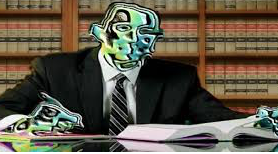Computers Won’t Replace Lawyers, But They Are Making Us Better and More Productive.
Posted By Cliff Tuttle | December 7, 2017
No. 1,368
Once, in my comparative youth, I was in the office of the Southern Railroad. I walked through the wrong door and found myself in a room the size of a gymnasium filled with desks and hundreds of middle-aged clerks with those green desk lamps and green eye shades. I am certain that this Dickensian scene has long since vanished. All of those guys were fired long ago, replaced, most likely, with a single computer. Was this a disaster to employment and the national economy? Absolutely not!
People have been constantly predicting that automation would cause mass unemployment for at least a century. In one sense, it does. But temporarily. It has replaced farm workers, but in the process it made food products both more plentiful and cheaper. Instead, it directly and indirectly created non-farming jobs that didn’t exist when farming itself was labor intensive.
A classic is the effect of ATM Machines on the employment of tellers. It was widely predicted that these now ubiquitous machines would cause the number of tellers to shrink to virtually nothing. What actually happened was that the ATM revolution made branches cheaper to run and lead to an explosion of bank branch openings, which meant the market for tellers actually increased. Read all about it in this Ross Intelligence blog post.
They are making the same predictions for lawyers. The equivalent of the Southern Railroad gymnasium exists in large law firms. They are doing things like legal research with the assistance of computers. Or they are writing or analyzing agreements, sometimes with the assistance of new software. The prediction is that the computers are becoming self guiding, causing the subordinate lawyer who uses them to become expendable. Will the time come where a computer will write the briefs for both litigants and the judge’s computer will read the briefs and write the draft opinion? Maybe, and maybe within our lifetime, too.
Of course, a single lawyer already is doing the work of a dozen lawyers a century ago. And a paralegal is doing the work of 2 or 3 secretaries and a few more lawyers. But, as with banking, the amount of work has not remained static. The volume of legal work has grown so rapidly that large, medium and small law firms have continued to grow. Perhaps the number of practitioners will shrink in time. But their numbers will be replaced by AI professionals and a host of service providers, like webinar producers, technicians and others.
While these trends are unfolding, it turns out that lawyers need a whole lot of help to keep their practice on the rails. If you think I exaggerate, read a few posts in a relatively new blog, the Algorithmic Society — Medium, by Ken Grady.
Lawyers, it turns out, are only human. They make lots of mistakes and even more bad decisions. Law firms need to develop policies and protocols for doing everything — billing, emails, case preparation, case evaluation, etc. Then, the protocols need to be enforced. Another word for this process: algorithms.
Although humans can work out most of the law practice algorithms they need, they must rely upon computers to force the members of the firm to follow them. Most catastrophic cases of professional liability are the result of failure to follow tried and true policies of the firm and the larger the firm gets, the harder policy becomes to enforce.
If this sounds like Big Brother, welcome to the 21st Century. Yet even a solo lawyer needs the steadying hand of tried and true algorithms, self-imposed.
A fascinating book on the subject is Algorithms to Live By, The Computer Science of Human Decisions, by Brian Christian and Tom Griffiths. I am rereading it now. Most of the algorithms discussed the book have been the subject of academic papers and they are fascinating. Too much here for one post. So, I’ll report on them from time to time. There is an algorithm to help you hire a secretary (assuming you want one). There are a raft of algorithms to help to reorganize a bookshelf or your files or a vast amount of data. At some point, it is more accurate and effective to sample the data rather than to manipulate the whole body.
The point here is that the lawyer of tomorrow will be computer-assisted in ways that we, the practitioners of 2017, can hardly imagine. The wild card that makes prediction of the future of lawyering (and most everything else) is our inability to see what kind of technology is just around the corner and what will be its unintended consequences.
CLT
Tags: Algorithms to Live By > Ross Intelligence Report > The Algorithmic Society.




